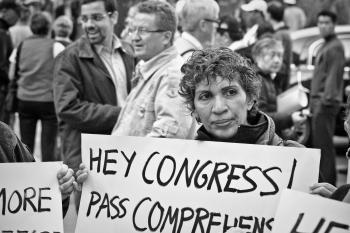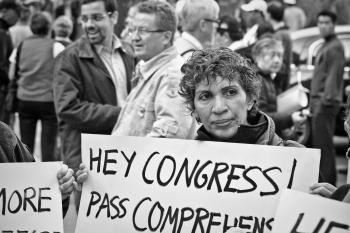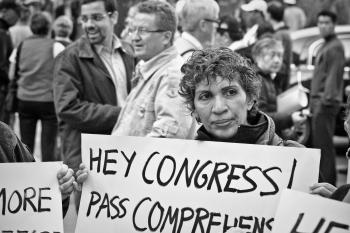NEW YORK—Mrs. Jin speaks Cantonese and Taishanese, lives on the third floor of a nondescript Chinatown apartment, and pays attention to good hospitality.
In 1971 she immigrated from Hong Kong to join her husband in the United States, and now gets daily visits from family members and health care workers who make sure she is doing alright. Twice a week her life lights up when Ms. Su Yinyang, her nurse, pops in for a visit.
A native of Guangdong Province, Mrs. Jin spent the first 50 years of her life in China, where she worked in the countryside, crouching around, harvesting rice. She spent her second 50 years here in the United States with her family, and is now 102 years old.
Mrs. Jin has five grandchildren and five great grandchildren. Robert, her grandson who keeps a look out for her, is 51 years old. They speak in Taishanese together.
Mrs. Jin still has some of the thrift that would have kept her in good stead in the Chinese countryside. She had squirreled away a napkin from a local restaurant under one of the seat cushions near her bed, for example, and unfurled it while being interviewed.
“That’s a very good tissue,” she said, before blowing her nose.
As a demonstration of ability, determination, or independence, Mrs. Jin most days traipses down the three flights of stairs from her apartment to the street. It only takes five minutes according to Su, the nurse.
Once a week Mrs. Jin visits the local senior center to stay in touch with the community and play an occasional game of Majong. She goes out to eat and helps to buy things that the home helper will later cook for her, under Mrs. Jin’s close watch. Mrs. Jin is a quick thinker, and not shy of explaining how the food should be cooked, says the home helper, who comes every weekday and used to work in a factory in Guangdong making vinyl for chairs.
Mrs. Jin has been through her share of difficulty. Soon after arriving in the United States, her husband died. Twenty years later her son, whom her life was then centered around, also died unexpectedly.
In 1971 she immigrated from Hong Kong to join her husband in the United States, and now gets daily visits from family members and health care workers who make sure she is doing alright. Twice a week her life lights up when Ms. Su Yinyang, her nurse, pops in for a visit.
A native of Guangdong Province, Mrs. Jin spent the first 50 years of her life in China, where she worked in the countryside, crouching around, harvesting rice. She spent her second 50 years here in the United States with her family, and is now 102 years old.
Mrs. Jin has five grandchildren and five great grandchildren. Robert, her grandson who keeps a look out for her, is 51 years old. They speak in Taishanese together.
Mrs. Jin still has some of the thrift that would have kept her in good stead in the Chinese countryside. She had squirreled away a napkin from a local restaurant under one of the seat cushions near her bed, for example, and unfurled it while being interviewed.
“That’s a very good tissue,” she said, before blowing her nose.
As a demonstration of ability, determination, or independence, Mrs. Jin most days traipses down the three flights of stairs from her apartment to the street. It only takes five minutes according to Su, the nurse.
Once a week Mrs. Jin visits the local senior center to stay in touch with the community and play an occasional game of Majong. She goes out to eat and helps to buy things that the home helper will later cook for her, under Mrs. Jin’s close watch. Mrs. Jin is a quick thinker, and not shy of explaining how the food should be cooked, says the home helper, who comes every weekday and used to work in a factory in Guangdong making vinyl for chairs.
Mrs. Jin has been through her share of difficulty. Soon after arriving in the United States, her husband died. Twenty years later her son, whom her life was then centered around, also died unexpectedly.







